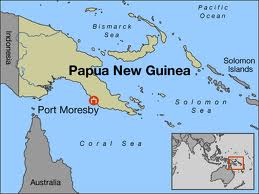 Rather than decide the weighty issues of law that were before it, the U.S. Court of Appeals for the Ninth Circuit recently sidestepped an important opportunity to clarify the territorial scope of the 1789 Alien Tort Statute (ATS). Instead, the court suggested that parties engaged in a ten-year-old lawsuit over a copper mining company’s role in inciting a civil war in Papua New Guinea attempt to mediate their dispute. We’re all for mediation as a way of settling disputes out of court, but the Ninth Circuit should have followed the fine example of the Second Circuit in ruling that corporations are immune from liability under the ATS.
Rather than decide the weighty issues of law that were before it, the U.S. Court of Appeals for the Ninth Circuit recently sidestepped an important opportunity to clarify the territorial scope of the 1789 Alien Tort Statute (ATS). Instead, the court suggested that parties engaged in a ten-year-old lawsuit over a copper mining company’s role in inciting a civil war in Papua New Guinea attempt to mediate their dispute. We’re all for mediation as a way of settling disputes out of court, but the Ninth Circuit should have followed the fine example of the Second Circuit in ruling that corporations are immune from liability under the ATS.
Further, Congress has given no indication that the ATS should apply to violations that occur outside the United States. In the absence of any such indication, it is inappropriate for federal courts to allow such suits to go forward. An overly expansive interpretation of the ATS threatens to undermine America’s foreign and domestic policy interests.
By exercising ATS jurisdiction over events taking place in foreign countries whose courts often have a much greater stake in those events than do American courts, the federal judiciary risks the creation of considerable conflict between the United States and those foreign countries—and they are doing so in the absence of any clear indication from Congress that it approves of such litigation.
A contrary interpretation simply turns America’s federal courts into unwelcome arbiters of the world’s disputes. But perhaps it’s best to let Judge Kleinfeld’s dissent speaks for itself:
It is risible to think that the first Congress wrote the Alien Tort Statute intending to enable federal courts to adjudicate claims of war crimes committed abroad. Were it otherwise, a French aristocrat who had escaped the guillotine and fled to Philadelphia could have sued French defendants in our newly organized federal courts, perhaps even Robespierre himself, and obtained an injunction commanding the bloody French revolutionaries to stop immediately. Perhaps we should have mediated the French Revolution, or issued a preliminary injunction to maintain the status quo while we decided whether we had jurisdiction? This silly hypothetical would be analogous to our adjudicating or mediating the class action claims in this case. The point of the Alien Tort Statute was to keep us out of international disputes, not to inject us into them.
WLF has long argued that the ATS does not apply extraterritorially.
